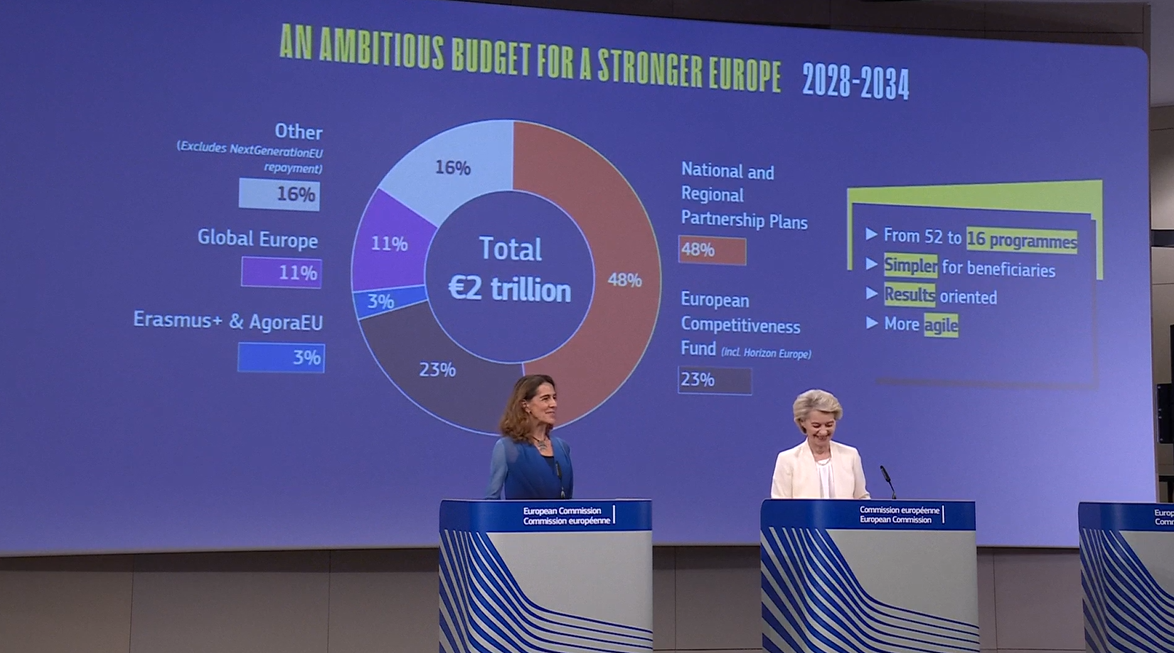Will the 2028–2034 EU budget protect children’s rights?
Eurochild's first reaction to the proposed Multi-Financial Framework (MFF).
On 16 July 2025, the European Commission President, Ursula von der Leyen, unveiled a proposal for the EU’s next long-term budget (MFF) amounting to €2 trillion, so significantly higher than the current one of €1.2 trillion. The proposal aims to simplify the budget framework by reducing the number of programmes from 52 to 16, organised under four key headings:
- Heading 1: the National and Regional Partnership Plans (NRPP);
- Heading 2: includes the European Competitiveness Fund and Horizon Europe, as well as Europe's cross-border education flagship programme Erasmus+, and the new ‘AgoraEU';
- Heading 3: hosts Global Europe, as well as the Common Foreign and Security Policy and Overseas Countries and Territories;
- Heading 4: expenditures for the European Public Administration.
Each heading includes defined funding ceilings and aims to enable more flexible spending, allowing faster responses to emerging challenges and ensuring fairer treatment for regions affected by national-level setbacks.
Eurochild welcomes the ambition to streamline and strengthen the EU budget and supports its increased flexibility. However, we stress children’s rights and social investment must remain central priorities in the next MFF.
Prioritising Children in EU Investment
Eurochild’s advocacy focuses on ensuring strong social investment, particularly to combat child poverty and social exclusion, within the future MFF. A key opportunity lies in the proposed National and Regional Partnership Plans, which will be backed by a €1 trillion envelope. Notably, 14% of this envelope is earmarked for reforms and investments in areas including skills, poverty reduction, social inclusion, and rural development.
As part of the plans, the European Social Fund Plus (ESF+) will contribute to play a central role by:
- Promoting equal opportunities for all;
- Supporting strong social safety nets;
- Fostering social inclusion and intergenerational fairness.
The proposed EU Facility within the Partnership Plans will provide additional funding for social innovation, experimentation and capacity-building, and provide budgetary guarantees to social infrastructure, including health and educational infrastructure, as well as social and student housing.
Strengthening Civil Society and Values
The next EU budget also reinforces people centred programmes such as:
- Erasmus+ (€40.8 billion), supporting lifelong learning, inclusion, and EU values;
- AgoraEU (€8.6 billion, incorporating the CERV programme with €3.5billion), strengthening civil society, cultural exchange, and media freedom.
Eurochild urges that the implementation of the recommendations of the EU Strategy on the Rights of the Child be integrated into these frameworks and adequately resourced.
Enlargement and Ukraine Support
The proposal includes €100 billion to support Ukraine’s recovery and EU integration. Under the Global Europe enlargement efforts will be performance-based, with support to candidate countries conditioned on meeting democratic, social, and human rights benchmarks.
Eurochild advocates for the extension of the European Child Guarantee (ECG) to enlargement countries, ensuring that children in these regions also benefit from targeted investment in their rights and well-being.
Children’s Rights and the European Child Guarantee
Marking four years since the Council Recommendation on the European Child Guarantee (ECG) was adopted, Eurochild reaffirms its commitment to ensuring the ECG delivers for Europe’s most vulnerable children. The ECG is a vital tool to secure access to free healthcare, inclusive education, nutritious food, adequate housing, and early childhood care.
To strengthen the ECG’s impact in the next MFF, Eurochild calls for:
- A dedicated child poverty earmarking within the National and Regional Partnership Plans, matching the current 5% ESF+ requirement and scaled up for countries with higher child poverty rates;
- Clear commitments from enlargement countries to develop national plans for the ECG as a condition for receiving EU funds and technical support.
Strong alignment between EU financial support and national policy frameworks to ensure accountability and reinforce political commitment.
Role of the European Semester and Rule of Law
Eurochild welcomes the 2025 European Semester’s stronger focus on social challenges, including child poverty. The Semester remains a key tool to guide Member States’ financial allocations and ensure sustained, child-focused investment.
While we support the ‘smart conditionality’ linking EU funds to respect for rule of law and fundamental rights, Eurochild stresses the need to maintain horizontal and thematic enabling conditions within the MFF Regulation to protect children’s rights and combat social exclusion and discrimination.
Stakeholder Involvement and Implementation Challenges
The success of the new budget framework will depend heavily on genuine stakeholder involvement, including civil society and children themselves. The National and Regional Partnership Plans must be designed and implemented in partnership with all relevant stakeholders such as local communities, regions, Member States, and the European Commission.
Eurochild urges:
- Stronger stakeholder engagement mechanisms from the outset, learning from the limited involvement in the Recovery and Resilience Facility;
- Robust procedures for inclusive and transparent participation throughout planning and implementation;
- Technical support and capacity-building for Member States to improve implementation of child-focused investments.
The recent amendments to the ESF+, shifting priorities toward strategic sectors like defence, green transition, and automotive industries, raise concerns. These changes risk marginalising social priorities such as child poverty, despite growing needs across the EU.
Persistent challenges are barriers to accessing ESF+ funds for children—highlight the need for better coordination, streamlined procedures, and clear accountability. Without addressing these issues, Member States may struggle to implement the broader and more complex Partnership Plans effectively.
To conclude
While the proposed MFF sets out a more political and high-level framework, much remains unclear about the operationalisation of existing initiatives like the European Child Guarantee, and the integration of new targets under the European Pillar of Social Rights and the EU Anti-Poverty Strategy.
Eurochild will continue to:
- Monitor developments closely;
- Advocate for children’s rights and child poverty reduction to be explicitly prioritised and ringfenced in the final MFF;
- Push for meaningful participation of children and civil society in shaping the future of Europe’s social investment agenda.
Children’s rights must not be sidelined in the next EU budget—they are a cornerstone of a just, inclusive, and sustainable Europe.



